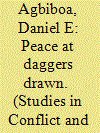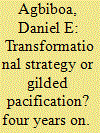| Srl | Item |
| 1 |
ID:
161532


|
|
|
|
|
| Summary/Abstract |
What does the ‘war on terror’ mean in a volatile local context in which soldiers have scant knowledge of the terrain and the identity of an adapting and potent guerrilla force that resembles the noncombatant population? This overriding question is addressed through a field-based study of the Civilian Joint Task Force (Civilian JTF) in northeastern Nigeria, a hybrid vigilante network of local ‘youth with sticks’ (kato da gora) and local hunters (yan faratua) working closely with the Nigerian military to identify and capture members of Boko Haram in their communities and in the surrounding bush. The article underscores the key role of the Civilian JTF as ‘knowledge brokers’ in sharpening up the counterterrorism surveillance of the Nigerian military.
|
|
|
|
|
|
|
|
|
|
|
|
|
|
|
|
| 2 |
ID:
172989


|
|
|
|
|
| Summary/Abstract |
Africa's informal transport sector is likely to continue to drive mass mobility well into the future and remain central to urban economies and the production of new city forms.
|
|
|
|
|
|
|
|
|
|
|
|
|
|
|
|
| 3 |
ID:
157862


|
|
|
|
|
| Summary/Abstract |
This article draws on in-depth fieldwork in Lagos, Nigeria, to explain the changing role of motor-park touts (agberos) in urban transport. Situating the emergence of agberos within the insecurity and radical uncertainty caused by the structural adjustment programme of the 1980s, this article explains the transformation of agberos in the light of their tacit incorporation into the National Union of Road Transport Workers, which politicized and altered their role in urban transport. It further argues that current efforts to rid motor-parks of agberos is inspired by the post-1999 urban renewal project of the Lagos State Government to transform Lagos into a ‘world class’ megacity. Yet, the embedded role of ‘big politics’ (i.e. the strategic alliance between the union and the state) helps to explain the difficulty of doing away with agberos in Lagos. By focusing on their changing role in Lagos, this article foregrounds the critical and mediating role of agberos in the day-to-day management of urban public transport, while illuminating the politics of violent patronage and extortion rackets in which they are popularly implicated.
|
|
|
|
|
|
|
|
|
|
|
|
|
|
|
|
| 4 |
ID:
155004


|
|
|
|
|
| Summary/Abstract |
Despite their centrality to the rhythm and practice of everyday urban life, there are, surprisingly, few studies on commercial minibus-taxis as a microcosm of city life in Africa, especially its precarious materiality. Using the trademark yellow minibus-taxis (danfos) in Lagos as a frame of reference, this paper explores what an interpretative analysis of the slogans that danfo workers paint on their vehicles can tell us about the city in which they weave their routine existence, especially the hopes, fears and actual material circumstances which informed their unique choice of slogans. Foregrounding the danfos as mobile bodies of meaning, the article finds that slogans not only reflect the lived realities of danfo workers, but are themselves vital means through which these workers get by, define their identity and expand their horizons of possibility.
|
|
|
|
|
|
|
|
|
|
|
|
|
|
|
|
| 5 |
ID:
132230


|
|
|
|
|
| Publication |
2014.
|
| Summary/Abstract |
More than 3,500 people have died in Nigeria since 2009 when Boko Haram, a radical Islamist group from northeastern Nigeria, launched its violent campaign to wrest power from the Nigerian government and foist an Islamic state under the supreme law of Sharia. Attempts at negotiating with the group, including the recent amnesty offer extended to its members by the Nigerian government, have stalled due to distrust on both sides and the factionalized leadership of the group's different cells. This article provides a systematic account of Boko Haram's emergence, demands, and modus operandi. It also evaluates how the Nigerian government has responded to the group's threat and how they should respond. The socioeconomic approach of this article helps to explain the Boko Haram problem beyond a usual religious agenda and to evaluate the development of the group in the context of Nigeria's checkered political history and local economic grievances.
|
|
|
|
|
|
|
|
|
|
|
|
|
|
|
|
| 6 |
ID:
140115


|
|
|
|
|
| Summary/Abstract |
My central aim in this paper is to evaluate the outcomes of the amnesty programme established in mid-2009 by the Nigerian government as a way of resolving the groundswell of violence in the oil-rich Niger Delta region. In particular, I focus analytic attention on the planning and implementation of the Disarmament, Demobilisation and Reintegration (DDR) process of the amnesty. I argue that while the amnesty promotes non-killing alternatives to conflict resolution and opens a door for stabilisation, its current planning and implementation is flawed and unable to reduce the long-term potential for armed conflict in the Niger Delta. Far from been a transformational strategy, I argue that the amnesty programme has become a strategy of gilded pacification essentially targeted at buying off militants and re-establishing oil and gas production in the Niger Delta without addressing the multilayered causes of peacelessness in the region.
|
|
|
|
|
|
|
|
|
|
|
|
|
|
|
|